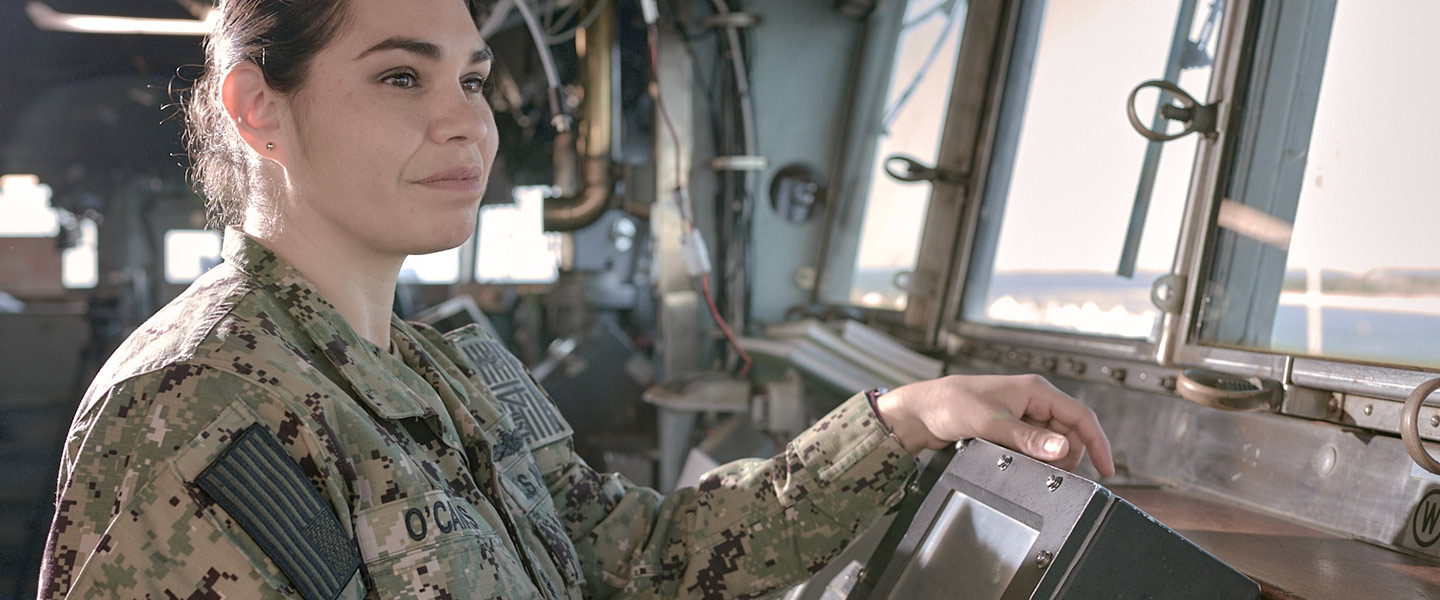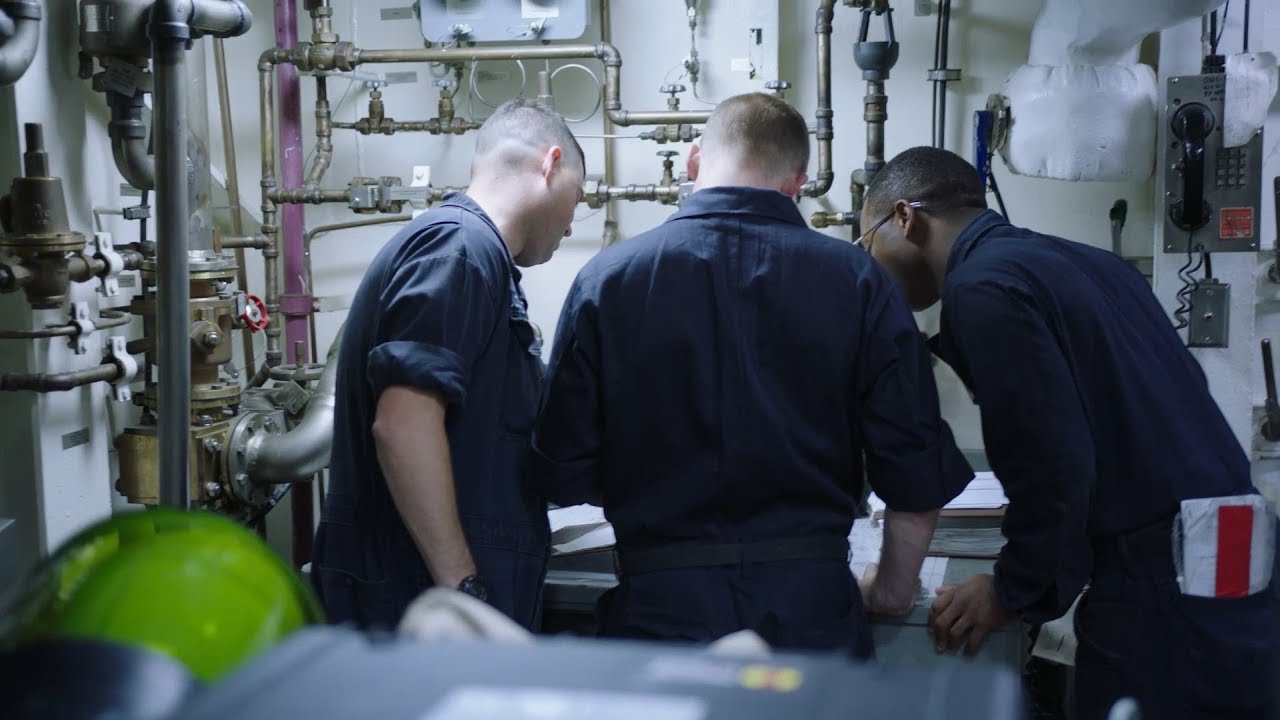What to Expect
More Information
Responsibilities
Nuclear Surface Warfare Officers form the backbone of fleet leadership. Prior to a tour aboard an aircraft carrier, you will sail in the conventional fleet of cruisers, destroyers, or amphibious ships conducting missions vital to national security, visiting foreign ports around the globe, responding to natural disasters and providing humanitarian aid, and leading talented Sailors and officers while completing initial qualifications. Your responsibilities could include:
- Directing personnel operations aboard Navy vessels, including aircraft carriers
- Managing shipboard weapons and defense systems to include vertical launch systems
- Using high-tech weaponry and advanced technology in battle and ship defense
- Providing support to Navy expeditionary forces, Theater Missile Defense operations, anti-submarine warfare, surface-to-air warfare and support and supply missions
Work Environment
Nuclear Surface Warfare Officers are exposed to a variety of different work environments, from academic settings, to training on prototype units, to sea tours and shore assignments. The time spent on conventional ships and nuclear-powered aircraft carriers involves deployments of several months at a time. Fully-qualified members may go on to hold positions that involve instructing, advising, consulting, recruiting or commanding surface ships in addition to time spent operating nuclear reactors aboard aircraft carriers.
Learn more about life on a ship.
Training & Advancement
Upon graduation from college, the formal training process of becoming an officer in the Naval Nuclear Propulsion program is officially underway. For those going the Surface Warfare Officer (Nuclear) route, the first step is Officer Candidate School (OCS) in Newport, RI. OCS is a program that provides a comprehensive and intense introduction to the responsibilities of Navy Officers over the course of approximately three months.
Following OCS, newly-commissioned Ensigns serve their first sea tour as a Division Officer on a conventional ship, leading a team of Sailors responsible for everything from electronics to weapons to ship operations. Here, officers work towards their Surface Warfare Officer qualification on a tour that lasts approximately 24 months.
After their first sea tour, officers will attend Naval Nuclear Power School (NNPS) in Charleston, SC. This 24-week graduate-level course of intensive study covers a variety of science and technology-based subjects, from calculus to thermodynamics to electrical engineering to reactor dynamics. NNPS provides the foundational knowledge necessary for a theoretical understanding of nuclear propulsion.
Next comes Nuclear Power Training Unit (NPTU), often referred to as Prototype, in either Charleston, SC, or Ballston Spa, NY. This 26-week course of instruction involves hands-on training with several operational reactor prototypes. Here, officers apply the concepts learned at Nuclear Power School – studying systems and components of a nuclear propulsion plant and working with all the associated systems of a full-scale operating plant. The training culminates with qualification as Engineering Officer of the Watch.
Following nuclear power training, officers are assigned as a Division Officer in the reactor plant of a nuclear-powered aircraft carrier for approximately 28 months. During this assignment, Nuclear Surface Warfare Officers complete their Prospective Nuclear Engineer Officer (PNEO) training and qualification, which is a Department of Energy certification recognized by the civilian nuclear power industry.
After completing their sea tours, Surface Warfare Officers may fill positions anywhere from Nuclear Power School and Prototype to other jobs ashore. They may be selected to serve on high-level staffs, work on strategic projects, or further their education by taking advantage of the many graduate school opportunities the Navy has to offer. The ultimate goal for many: to one day command their own surface ship.
Post-Service Opportunities
With a career as a Nuclear Surface Warfare Officer, you will have incredible post-service prospects. The highly-selective nature of the program combined with world-class advanced training and qualifications means your skills and knowledge are in high demand. Adding "Navy Nuke" to your list of accomplishments will make you a top candidate for a variety of future careers including civilian engineering and management jobs after you complete your service.
Education Opportunities
In addition to the best-in-class training and state-of-the-art facilities, current undergrad students who meet the prerequisite background will also get the chance to get paid while finishing school through the Nuclear Propulsion Officer Candidate (NUPOC) program. Students in majors like mathematics, engineering, physics and chemistry may receive preferred acceptance into the program.
If accepted into the NUPOC program as an aspiring Surface Warfare Officer (Nuclear), you can:
- Receive a salary in excess of $4,000 per month for up to 30 months prior to your college graduation
- Receive an immediate one-time sign-on bonus of $15,000 plus an additional $2,000 bonus upon completion of nuclear propulsion training
- Enjoy military health-care benefits while you are a student in the program
- Have your college years enrolled in the program count towards retirement
- Be a full-time student with no military duties while in college
Interested candidates should connect with a recruiter and ask about joining a related Q&A information session. This will help you learn more about what the job entails and get answers for any of your questions. These sessions are conducted weekly with no obligation to join the program in order to attend.
Postgraduate Education Opportunities
Once you’re out of school you’ll have a position waiting as a respected professional and officer affiliated with the most accomplished nuclear program on earth. Beyond undergraduate and formal Navy training and education, you can pursue additional graduate education by:
- Completing Joint Professional Military Education (JPME) at one of the various service colleges
- Using Tuition Assistance to attend online or in-person graduate programs during shore assignments.
- Navy College Program
- VOLED Assistance Center
- VOLED Region Advisors
- The Naval Postgraduate School (NPS)
- Navy War College (NWC)
- USAF Air University Air Command and Staff College
Qualifications & Requirements
Because of the demanding nature of Naval Nuclear Propulsion Program and the magnitude of the responsibilities members will take on from a young age, requirements to become a candidate and join NUPOC are stringent. The NUPOC program is open to both men and women.
To be an eligible candidate, you must:
- Be a U.S. citizen (dual citizens must renounce non-US citizenship)
- Be at least 19 years of age and less than 29 years of age at the time of commissioning—waivers up to 31 years of age are considered on a case-by-case basis
- Meet any additional physical standards of the Navy
Education
Candidates must be graduates or students of an accredited college or university in the United States or in a United States territory pursuing a BA, BS or MS (preferably major in mathematics, engineering, physics, chemistry or other technical areas but not required). Those still in school may apply as early as 30 months from completion of an undergraduate degree for a Surface Warfare (Nuclear) position. Applicants may also join the NUPOC program as early as 12 months from completion of a master's degree. Additional academic requirements include:
- Completed one academic year of calculus
- Completed one academic year of calculus-based physics
- A competitive GPA and a minimum grade of "C" in all technical courses
General qualifications may vary depending upon whether you’re currently serving, whether you’ve served before or whether you’ve never served before.
Part-Time Opportunities
There are no part-time jobs as a Navy Reserve Sailor in this role. Go back to Careers to find other jobs that have a Reserve component. You can also find out more about what life is like as a Reserve Sailor in the Navy.

































































































































